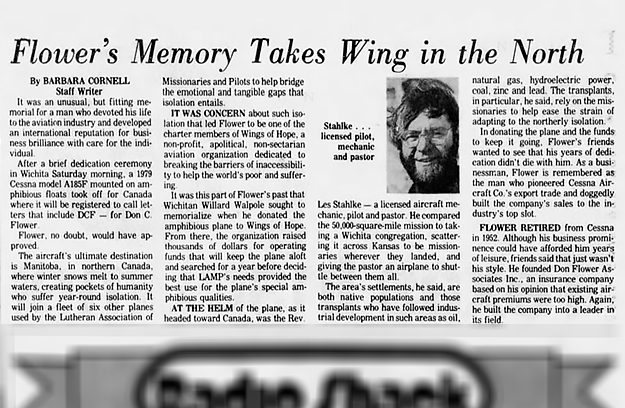Date: February 22, 1981
Location: Wichita, KS
By: Barbara Cornell
Newspaper: The Wichita Eagle
Page: 4E
It was an unusual, but fitting memorial for a man who devoted his life to the aviation industry and developed an international reputation for business brilliance with care for the individual.
After a brief dedication ceremony in Wichita Saturday morning, and 1979 Cessna model A185F mounted on amphibious floats took off for Canada where it will be registered to call letters that include DCF – for Don C. Flower.
Flower, no doubt, would have approved.
The aircraft’s ultimate destination is Manitoba, in northern Canada, where winter snows melt to summer waters, creating pockets of humanity who suffer year-round isolation. It will join a fleet of six other planes used by the Lutheran Association of Missionaries and Pilots to help bridge the emotional and tangible gaps that isolation entails.
It was concern about such isolation that led Flower to be one of the charter members of Wings of Hope, a non-profit, apolitical, non-sectarian aviation organization dedicated to breaking the barriers of inaccessibility to help the world’s poor and suffering.
It was this part of Flower’s past that Wichitan Willard Walpole sought to memorialize when he donated the amphibious plane to Wings of Hope. From there the organization raised thousands of dollars for operating funds that will keep the plane aloft and searched for a year before deciding that LAMP’S NEEDS provided the best use for the plane’s special amphibious qualities.
At the helm of the plane, as it headed toward Canada, was the Rev. Les Stahike – a licensed aircraft mechanic, pilot and pastor. He compared the 50,000-square-mile mission to taking a Wichita congregation, scattering it across Kansas to be missionaries wherever they landed, and giving the pastor an airplane to shuttle between them all.
The area’s settlements, he said, are both native populations and those transplants who have followed industrial development in such areas as oil, natural gas, hydroelectric power, coal, zinc and lead. The transplants, in particular, he said, rely on the missionaries to help ease the strain of adopting to the northerly isolation.
In donating the plane and the funds to keep it going. Flower’s friends wanted to see that his years of dedication didn’t die with him. As a businessman, Flower is remembered as the man who pioneered Cessna Aircraft Co.’s export trade and doggedly built the company’s sales to the industry’s top slot.
Flower retired from Cessna in 1952. Although his business prominence could have afforded him years of leisure, friends said that just wasn’t his style. He founded Don Flower Associates Inc., an insurance company based on his opinion that existing aircraft premiums were too high. Again, he built the company into a leader in its field.
